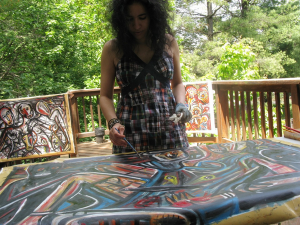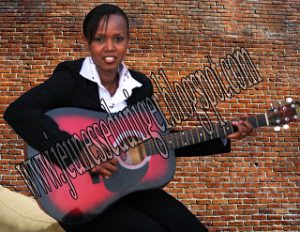By Jennifer Dees
As a writer, I feel that identity is tied to art. I’ve wondered at the painter’s mind while staring at furious strokes of color. I’ve watched musicians lose themselves in a powerful song. And I’ve seen dance movements that express more than words ever could. So I set out to discover female Nigerienne artists and explore how these women empower themselves through their art.
My interested sparked when I came across a painter named Mariama. Her folk, abstract style is full of color and life, much like herself. According to an interview by Wali Africa, her fascination with bright colors comes from her cultural heritage. “If you give an African person some colors, most will pick the brightest, happiest colors. This is because that is what is in their hearts.” Her ethnicity is Tuareg, a seminomadic people whose women are confident, strong, and free. Mariama says that African people are full of life, that their greatest empowerment is their respect for themselves. This outlook definitely comes through in her paintings, which are in a style that I haven’t seen much of before.

Other artists express their beliefs and hopes through song. To me, to sing is to let your inhibitions fall away and to show what’s in your heart. Hamsou Garba is one such singer, and perhaps the most popular female singer in Niger. She hosts a radio talk show and uses her voice to cover themes like national unity, public health, and girls’ schooling. She strives to progress advance the rights of women and children as well as preserve traditions for future generations. Her music videos and style of singing are so unlike what I hear on the radio. It doesn’t feel like she’s playing out some story for the camera.
Another popular singer is Safiath, whose rich vocals has appeared in a variety of genres. She’s represented her country in international music events, many of her songs featuring themes such as children’s rights, education for girls, and leadership in Niger. According to an interview by Jeunesse Du Niger, she wishes that more people would be willing to listen to Nigerien music and less mainstream music. But whatever other people do, she is determined to push herself to do better. She maintains that “Good work forces respect.”

I carried oncontinued my research into what I was looking forward to the most: literature. I came across Hélène Kaziende. Her short story “Le Déserteur” won against a thousand competitors in an Africa No. 1 radio station competition. She was the first woman to write a political novel in Niger, and she currently teaches and promotes Nigerien literature and culture. She writes of struggle and imprisonment, of hope and changing fate. I read the first paragraph of Kaziende’s Aydia, a story about two girls who work to control their fate, one through labor and the other through school. I was hooked, albeit surprised. I, an English major, who am is supposed to live and breathe literature, haven’t hasn’t looked far beyond the Hemingways and Hawthornes of this world, so discovering this story felt like a gateway to a new library; I have so much more to read and so much more to learn.
These Nigerienne women have used art to express their souls, their beliefs, and their culture. This art is a fountain of perspective and meaning. Most of what we read in America is American or European literature. We watch American television and discuss American politics. Even when we hear of other countries, we hear it through American news channels. And that’s alright; it makes sense. But before I wrote this article, I didn’t realize how much of a bubble I was livinge in, and how much of the world people miss out on. Now I’ve recognized how easily a culture can be covered up and ignored. But mMusic, dance, literature, and other art forms may be the key to sharing the vast, rich cultures in of Niger. Not solely for the country’s benefit, but to connect ourselves to something fuller and greater than we already know.


